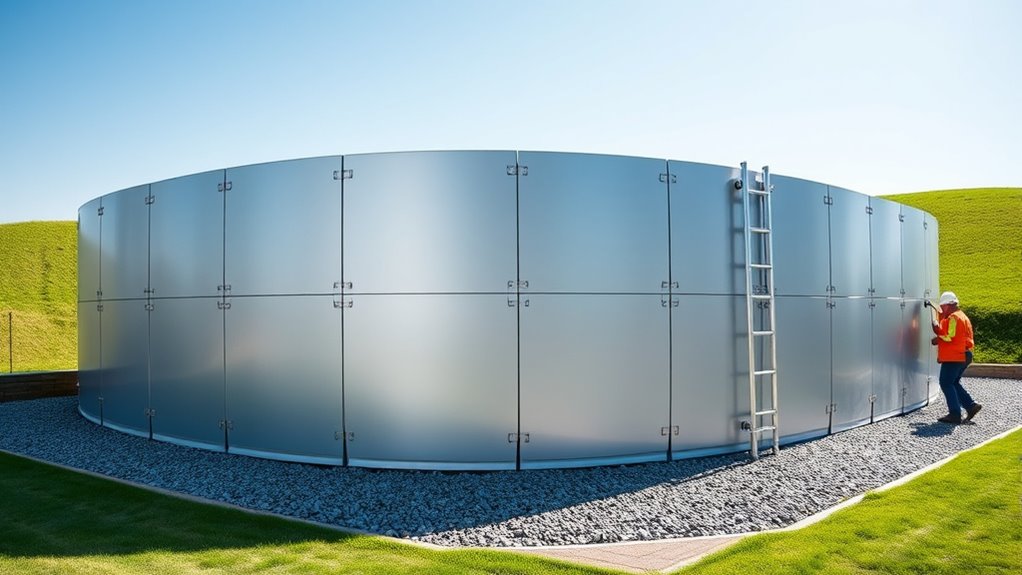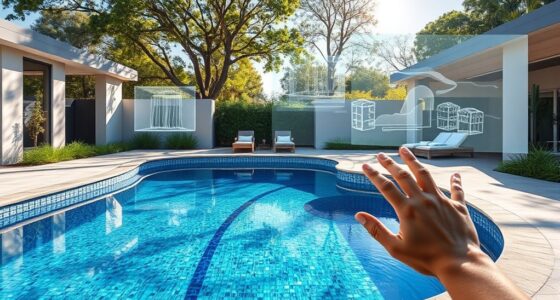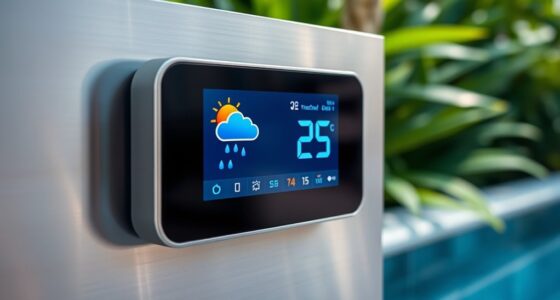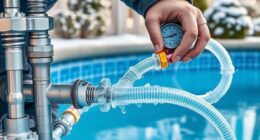Modular and prefabricated pool systems let you enjoy a pool faster and with less hassle. They’re designed for quick installation, often taking just days instead of weeks or months. You can choose customizable shapes and features to match your backyard, all while benefiting from straightforward assembly and reduced construction costs. These systems also minimize backyard disruption and simplify future repairs. Keep exploring to discover the different materials and maintenance tips that make these options ideal for your needs.
Key Takeaways
- Prefabricated pool components allow for quick assembly, reducing installation time from weeks to days.
- Modular systems utilize standardized parts for faster setup and easier repairs or upgrades.
- Material choices like polymer and fiberglass simplify handling and speed up installation compared to traditional pools.
- Assembly involves straightforward steps such as snapping or bolting components, streamlining the process.
- Design flexibility ensures customized pools can be installed efficiently without extensive construction delays.
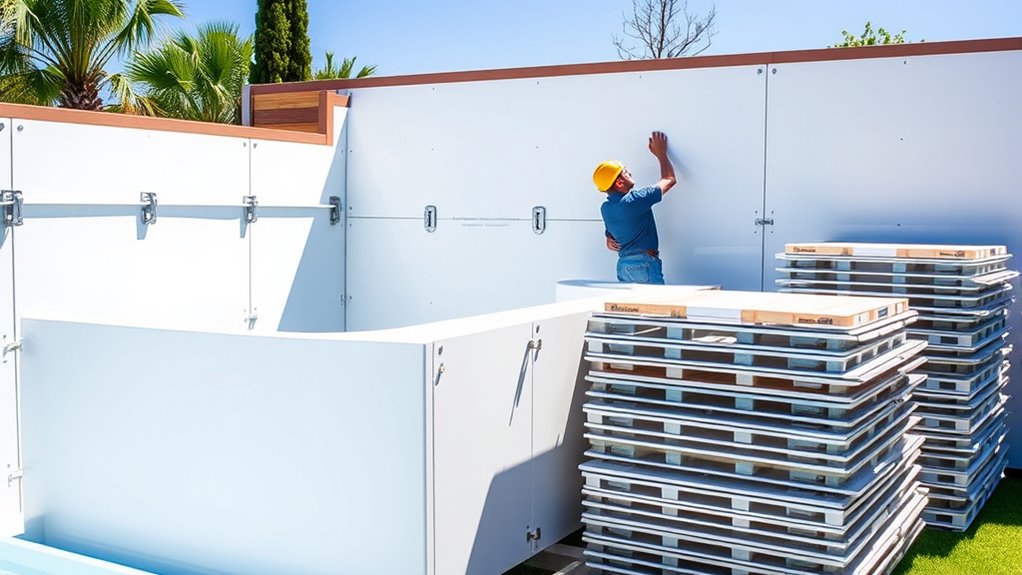
Are you looking for a flexible and cost-effective way to enjoy a pool in your backyard? Modular and prefabricated pool systems might be just what you need. These systems are designed for quick installation, making them a popular choice for homeowners seeking a hassle-free way to add a pool without the lengthy construction process. One of the first things you’ll want to contemplate is your pool material choices, as they influence both the durability and appearance of your pool. Options like steel, polymer, or fiberglass panels each have their own benefits and maintenance considerations. Steel panels are sturdy and long-lasting but may require additional protective coatings to prevent rust. Polymer panels are lightweight, resistant to corrosion, and easier to handle during installation, which can speed up the process. Fiberglass pools are pre-formed shells that are highly durable and require minimal maintenance once installed. Each material choice impacts not just the initial cost but also the ongoing care you’ll need to provide to keep your pool in top condition.
When selecting a modular system, it’s essential to think about maintenance considerations. For example, pools made with steel panels may need regular checks for corrosion and periodic recoating to prevent deterioration. Polymer pools, on the other hand, tend to require less upkeep because they resist rust and other environmental damage. Fiberglass pools are known for their smooth, non-porous surfaces, which make cleaning easier and help prevent algae buildup. The installation process itself is much faster compared to traditional in-ground pools, often taking just days rather than weeks or months. This means you can start enjoying your new pool sooner and with less disruption. Modular systems also tend to be more adaptable; you can often customize size, shape, and features to fit your backyard space and lifestyle. Additionally, these systems often incorporate standardized components, simplifying repairs and future upgrades.
Furthermore, these pools are usually designed for straightforward assembly, often with detailed instructions and prefabricated components that snap or bolt together. This not only reduces installation time but also minimizes the need for extensive construction expertise or heavy machinery. As a homeowner, you’ll appreciate the convenience of a pre-designed system that can be set up with minimal fuss. While the upfront investment might be comparable to traditional pools, the savings in time and labor often make modular and prefabricated pools a smart, practical choice. Plus, their flexible design options allow you to optimize your backyard space and enhance your outdoor living experience without sacrificing style or functionality. Overall, with the right pool material choices and careful attention to maintenance considerations, you can enjoy a beautiful, durable pool that’s quick to install and easy to care for.
Frequently Asked Questions
What Are the Long-Term Maintenance Costs for Modular Pools?
Your long-term maintenance costs for modular pools are generally lower than traditional pools, thanks to their durability factors and easier access for repairs. The cost comparison shows fewer expenses on structural repairs and upgrades over time. Plus, their modular design allows you to replace or upgrade parts without extensive work, reducing overall costs. With proper upkeep, you can enjoy a durable, cost-effective pool experience for years to come.
Can Modular Pools Be Customized in Shape and Size?
You can absolutely customize your modular pool’s shape and size, blending your unique pool design with flexible material options. Unlike traditional pools, these systems offer a wide variety of shapes, from freeform to geometric, ensuring your vision comes to life. You get the convenience of quick installation without sacrificing your desired style or size, making it easy to match your outdoor space and personal preferences seamlessly.
How Do Modular Pools Perform in Extreme Weather Conditions?
You’ll find that modular pools perform well in extreme weather conditions, thanks to their seasonal durability and insulation effectiveness. Their sturdy materials help withstand temperature fluctuations, wind, and rain, ensuring your pool stays intact longer. Proper installation and insulation also improve energy efficiency and protect against cold snaps. While no pool is completely immune to harsh weather, modular systems are designed to handle these challenges better than traditional options.
Are Modular Pool Systems Environmentally Sustainable?
Yes, modular pool systems are environmentally sustainable. You’ll appreciate their sustainability benefits, like reduced waste during manufacturing and installation. They use eco-friendly materials that are recyclable and have a lower carbon footprint compared to traditional pools. Plus, their efficient design minimizes resource consumption, helping you enjoy a beautiful pool while supporting eco-conscious choices. By choosing modular pools, you’re investing in a greener, more sustainable backyard feature.
What Is the Typical Lifespan of a Modular Pool System?
Ever wondered how long a modular pool system lasts? Typically, you can expect a lifespan of 10 to 15 years, depending on pool material and installation techniques. Proper maintenance extends its durability, making it a cost-effective choice. Choosing high-quality materials and skilled installation guarantees your pool remains durable and attractive for years. Are you ready to invest in a pool that offers both speed and longevity?
Conclusion
Think of modular pool systems as the key to unfastening your backyard paradise swiftly and effortlessly. Just like a puzzle piece fitting perfectly into place, these systems symbolize seamless integration and immediate enjoyment. With faster installation, you’ll soon be diving into your personal oasis, turning dreams into reality. Embrace this innovative approach, and let your outdoor space become a symbol of convenience and relaxation, ready to welcome you home whenever you need a revitalizing escape.
